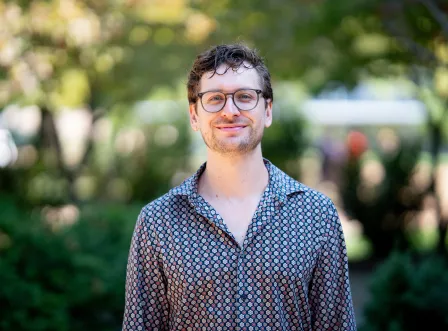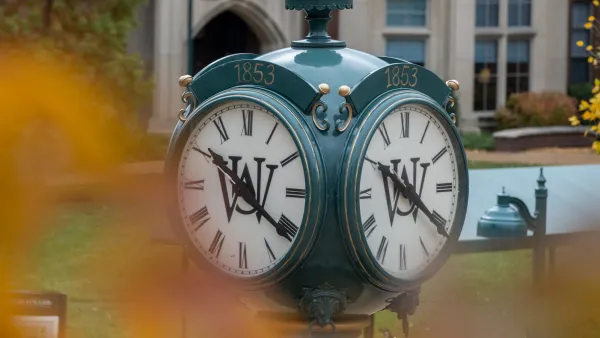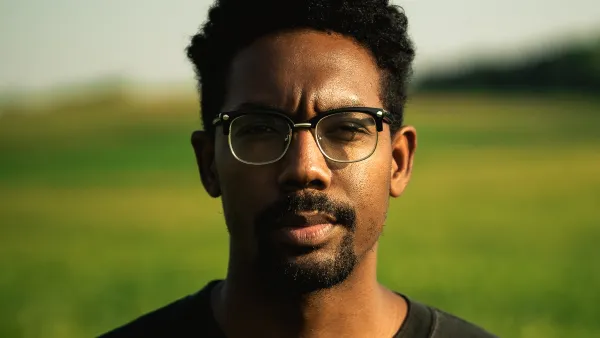
Alex Ullman, a scholar of 20th- and 21st-century American literature and performance studies, joined the Center for the Humanities in August 2024 for a two-year postdoctoral fellowship with the Mellon-funded program Modeling Interdisciplinary Inquiry. The fellowship supports interdisciplinary scholarship and teaching across the humanities and interpretive social sciences.
Ullman is a writer, teacher and musician. He earned a PhD in English from the University of California, Berkeley in 2024. His most recent article is “Audre Lorde, Sound Theorist: Register, Silence, Vibrato, Timbre,” published in the Modern Language Association’s journal PMLA in May 2024.
Below, we asked Ullman about his academic interests (and where his training a saxophonist fits in), his current projects and his prioritization of public humanities.
Tell us about yourself! Where did you grow up? Or, where do you now consider “home”? What do you like to do outside of your work?
I was born in Allentown, Pennsylvania, but I grew up in a small town about ten miles south named Emmaus. Home is a difficult concept for me: I guess I’d say its wherever the nearest pencil or word processor is. I spend my free time these days writing stories, experiencing theater, walking in nature or studying Yiddish.
How do you describe your academic interests? How does your training as a saxophonist influence your focus as a scholar?
My academic interests are quite varied, but I’d say they largely revolve around literature and performance. I read texts, and then I think and write about them in relation to performed versions of those texts. I’m interested in that gap between the page and the stage and other gaps that accompany that one: gaps of translation (between languages or sign systems) or thematic and historical gaps of diasporic experience (between homeland and hostland).
Maybe this interest in gaps is connected to my musical experience because I grew up just an hour south of another gap: the Delaware Water Gap, where there was a vibrant jazz scene. Musicians would trickle up and down Highway 33 and east and west to NYC. There were some very important educators who taught me not only how to play but also to respect and study the history of Black music. Improvising for me is always about exploring very tiny things — finger speed, voice leading, key changes — in relation to much bigger things — arcs of tension and release, relationships, histories of power. I’d like to think my scholarly work traverses those gaps, too.
What are you working on during your postdoc in the humanities center?
I’m writing a book based on my dissertation called “This Feeling Tone: The Performance of Black and Jewish Conversation.” It’s about this trope of the “Black-Jewish dialogue” that gets mobilized, sadly, every time there is a moment of intensified racial violence in the country. My work attempts to think about Black and Jewish artists who had relationships, drew on their own rich and varied cultural traditions and created art with or alongside each other. Conversation was an embodied and aesthetic practice for these artists, not (just) a hackneyed political trope.
I teach a class subtitled “U.S. Diasporic Cultures” that largely explores this history across the 20th and 21st centuries. It introduces students to critical thinkers of diaspora like Stuart Hall and Ben Ratskoff as we consider artworks ranging from the The Jazz Singer (1927) to Ta-Nehisi Coates’ The Message (2024).
Alongside your scholarship, you have a portfolio of public writing and you ran the public humanities initiative “Read-Along with Berkeley English” during graduate school. How does this public-facing work fit into your goals as an academic?
I believe that questions about aesthetics and politics cannot be separated from public, dialogic practice. Part of what upholds this belief is my commitment to the survival of the humanities: We exist in a culture that devalues humanities education — even qualitative experience, more generally — and it is our burden as humanists to communicate our work and its political urgency. The capitalists, technocrats and fascists aim to flatten and commodify language: I see it as my job to express, teach against and otherwise resist this imposed percepticide. But the other part that upholds this belief is that I just really enjoy talking with and to other people.




